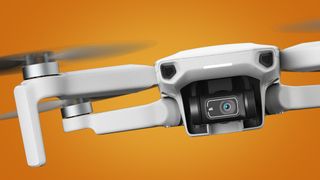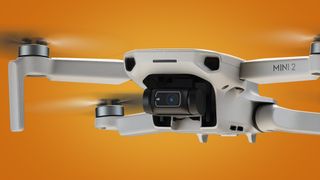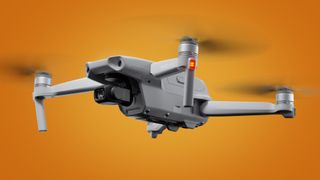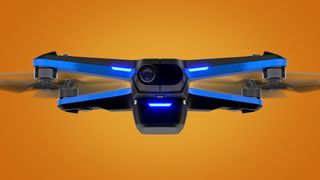In a decidedly un-festive move, the US government recently placed drone maker DJI on its ‘Entity List’, the same trade blacklist that Huawei found itself on last year.
Considering DJI is the world’s biggest drone brand and dominates our list of the best drones you can buy, this is huge news for the many people who enjoy shooting stunning aerial photos and videos.
But what exactly does the DJI ban mean for current and prospective owners of flying cameras like our current top choice, the DJI Mavic Air 2?
It’s a complex issue, but thanks to a combination of analyst insight, official DJI responses and our own knowledge of the drone market, we’ve put together this breakdown of everything you need to know about the DJI ban situation in one handy place.
DJI ban: what has happened and why?
On 18 December the US Department of Commerce announced that several companies, including Chinese drone maker DJI, had been added to its ‘Entity List’.
This list trade blacklist, which Huawei was added to in 2019, doesn’t prohibit DJI from selling its products in the US. But it does restrict DJI’s access to US technologies, which could impact the company’s worldwide supply chains and product development.
While the US government didn’t specifically reveal why DJI had been added to the ‘Entity List’, it did reveal two reasons why four companies (including DJI) had been blacklisted.
According to the US government’s Federal Register, these include “enabling wide-scale human rights abuses within China through abusive genetic collection and analysis or high-technology surveillance” and “facilitating the export of items by China that aid repressive regimes around the world”.
We suspect that this won’t have an immediate impact on the availability of DJI products, but may limit the supply of DJI products towards the middle of 2021 as current stock of units and materials run out.
David Benowitz, DroneAnalyst
All of this has been deemed “contrary to US foreign policy interest”, so DJI has been placed on the list, which could have big some big knock-on effects for the company and drone fans.
Again, there is no ban on buying or selling DJI’s products in the US. The ‘Entity List’ instead limits “exports, rexports and transfers” to companies named on the list, so it could restrict DJI’s ability to use US-based components or technologies.
How does it affect flying or buying DJI drones today?
Right now, not at all. After the decision was announced, DJI told us: “DJI is disappointed in the U.S. Department of Commerce’s decision. Customers in America can continue to buy and use DJI products normally. DJI remains committed to developing the industry’s most innovative products that define our company and benefit the world.”
You can carry on flying or buying drones like the DJI Mini 2 or DJI Mavic Air 2 as normal, as there’s been no immediate impact on the availability or stock of its drones and gimbals.
However, there’s a chance this could change next year. We spoke to David Benowitz, Head of Research at DroneAnalyst and a former DJI Marketing Manager, about how the US government’s decision to place DJI on its ‘Entity List’ might impact the company’s ability to sell its existing products.
David Benowitz told us: “We suspect that this won’t have an immediate impact on the availability of DJI products, but may limit the supply of DJI products towards the middle of 2021 as current stock of units and materials run out.”
In a separate blog post, DroneAnalyst added “we expect that there will be a huge buyout of DJI’s existing stock in the weeks to come by US distributors.” However, at this stage, this all remains speculation regarding the availability of DJI’s drones.
What does it mean for DJI and drones in 2021 and beyond?
The long-term impacts of the decision on DJI and the worldwide drone market are harder to predict. There’s a good chance we’ll start to see new DJI alternatives emerge in the consumer drone space, particularly in the US. But DJI may already have contingency plans in place, given the US government’s decision hasn’t exactly come out of the blue.
This isn’t the first time DJI has experienced friction with US authorities. In May 2019, the Department of Homeland Security issued an alert raising its concerns about Chinese-made drones, while a US ruling in May this year suggested that DJI drones could be banned due to patent infringements.
This means DJI has likely been planning for US disruption, which could help soften the long-term impacts. As DroneAnalyst’s Benowitz told us: “Even before being added to the Entity List, DJI has invested in moving its supply chain to China, which will limit the long-term impacts on the company.”
He added: “The larger impact will be consumers reconsidering DJI products based on claims that they are supporting human rights abuses and aiding repressive regimes around the world. We are likely to see new US start-ups become more competitive and release new drones into markets dominated by DJI, such as the affordable camera drone space.”
Right now, DJI dominates the hobbyist and pro aerial photography space, thanks to drones that range from the beginner-friendly DJI Mini 2 to the DJI Mavic 2 Pro. While our reviews have found these flying machines to be the best in their class, DJI’s addition to the US Entity List will likely see some long-awaited competition emerge in the US and potentially worldwide.
That’s unlikely to happen overnight, though. DJI’s dominance has ensured that potential rivals, including GoPro and Parrot, have already turned away from consumer drones, so it’ll be left to relatively new players like US-based Skydio and Autel Robotics to step up their hobbyist drone games.
This means that, according to DroneAnalyst, we will “likely see the hardware sector stall over the next year as DJI competitors either scale out their supply chains to meet the demand or diversify their product line to capture more of DJI’s market share.”
With DJI potentially sidetracked by supply chain issues, we could potentially see fewer new drone releases and heftier price tags in 2021, according to DroneAnalyst: “Consumers and businesses should expect limited availability of all drones on the market and higher prices as they move to DJI alternatives.”
Of course, all of these possible outcomes remain speculation – and whatever happens to new drones in 2021, the likes of DJI and Autel already have some excellent flying cameras for us to choose from. But there’s no doubt the US government’s decision is a Huawei-style bombshell that will continue to have repercussions in 2021 and beyond for those looking to take up drone flight.




Comments are closed.